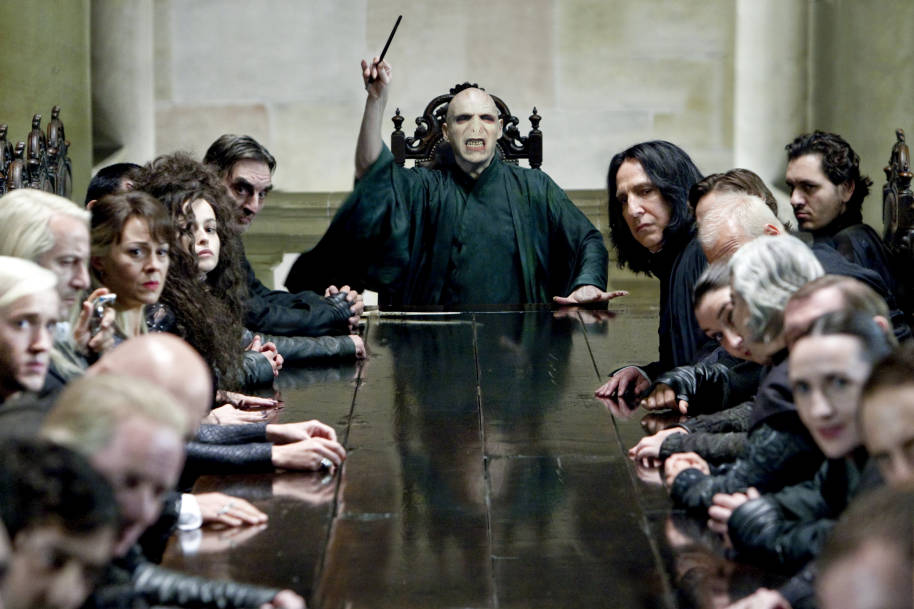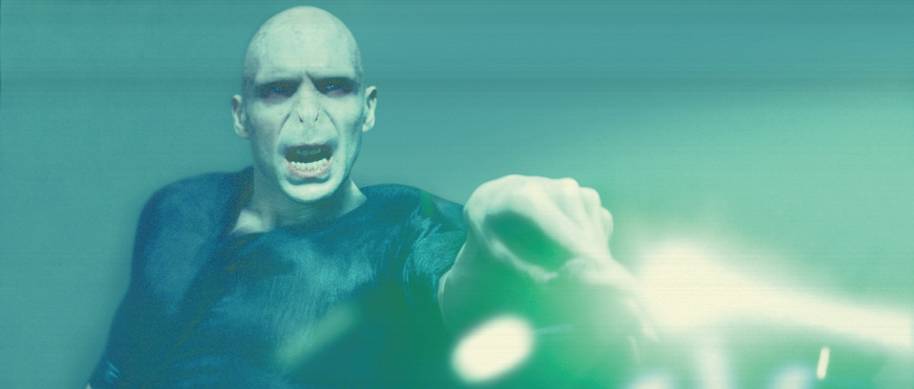Followers over friends
When teaching Harry about Horcruxes in Harry Potter and the Half-Blood Prince, Dumbledore shared memories he had collected about the childhood of Lord Voldemort – or Tom Riddle, as he was then known. During Riddle’s Hogwarts days, Dumbledore observed:
‘As he moved up the school, he gathered about him a group of dedicated friends; I call them that, for want of a better term, although as I have already indicated, Riddle undoubtedly felt no affection for any of them.’ Harry Potter and the Half-Blood Prince
These early followers – for Riddle was their leader, even if he pretended to be their friend – were ‘forerunners of the Death Eaters, and indeed some of them became the first Death Eaters after leaving Hogwarts.’ From then on, the people who surrounded Lord Voldemort were referred to as his followers, his Death Eaters, but very rarely was the word ‘friend’ used by either Voldemort or others. And the same can be said of Gellert Grindelwald. As the entire city of Paris was covered in his dark banners, Tina warned, ‘it’s Grindelwald. He’s calling his followers.’
Followers not friends.

The making of impassioned speeches
On stage at the underground amphitheatre in Crimes of Grindelwald, Grindelwald spoke, and people listened. Grindelwald addressed those listening as ‘my brothers, my sisters, my friends’. But we know many of those in the crowd were not ¬– and would never be – his friends; Tina was there, as were Newt and Leta. What he was doing was making a speech, trying to persuade, trying to anger, trying to gain followers. And most of all trying to justify his actions.
Interestingly, Lord Voldemort also made epic, justificatory and impassioned speeches. He made a speech to the Death Eaters that gathered in the graveyard at Little Hangleton the night he returned to his body:
‘But I want there to be no mistake in anybody’s mind. Harry Potter escaped me by a lucky chance. And I am now going to prove my power by killing him, here and now, in front of you all, when there is no Dumbledore to help him, and no mother to die for him.’ Harry Potter and the Goblet of Fire

And he couldn’t help but make a speech to Harry at their very last encounter, even as they circled each other to fight the duel that would end it all.
‘Is it love again? […] Dumbledore’s favourite solution, love, which he claimed conquered death, though love did not stop him falling from the Tower and breaking like an old waxwork? Love, which did not prevent me stamping out your Mudblood mother like a cockroach, Potter – and nobody seems to love you enough to run forwards this time, and take my curse. So what will stop you dying now when I strike?’ Harry Potter and the Deathly Hallows
Both Voldemort and Grindelwald knew the power of words; their ability to scare and to encourage, as well as their power to spread disharmony and fear. Both men also appeared to like the sound of their own voices – their speeches were long, rhetorical and often focussed on themselves, bringing others into their own mythologies rather than recognising other people’s stories.

Spontaneous acts of violence
As well as the power of words, both knew the power of violence – particularly spontaneous acts of violence – as a means of spreading fear and asserting their dominance.
‘Kill the spare’ Voldemort casually said as he ordered the murder of Cedric Diggory. This coming moments before he used the Cruciatus curse on Avery ¬– one of his own Death Eaters – as Avery begged for his master’s forgiveness.
Grindelwald committed these violent acts too, despite claiming otherwise in his speech in the underground amphitheatre: ‘Go forth from this place and spread the word: It is not we who are violent.’
Grindelwald hid out in Parisian homes and his every move was tinged with the green light of the Killing Curse. While he waited on a street, his followers killed those inside to allow his entry. He didn’t cast the curse himself but we assume it was on his orders, and he tapped his cane carelessly on the pavement whilst he waited.
Inside, a baby was left alive only to face the green light of Carrow’s Killing Curse a few moments later, again on Grindelwald’s nod. The baby’s crime? Being in the wrong place at the wrong time. Years later, Lord Voldemort murdered Frank Bryce at the beginning of Harry Potter and the Goblet of Fire for eavesdropping.

Obsession
Gellert Grindelwald and Lord Voldemort both had obsessions, and they are oddly aligned. Voldemort was obsessed with Harry Potter – the Boy Who Lived – to the extent that he did not allow his Death Eaters to come to his aid in the graveyard at Little Hangleton, though he had been reborn for mere minutes. As the cores of Voldemort’s and Harry’s wands connected, Voldemort shrieked: ‘Stand aside! I will kill him! He is mine!’ In Goblet of Fire, Wormtail suggested using another wizard’s blood for Voldemort’s rebirth because it would be easier, but his master replied: ‘I have my reasons for using the boy, as I have already explained to you, and I will use no other.’
Gellert Grindelwald was similarly focussed on another: Credence Barebone. In contrast to Voldemort’s obsession with killing Harry, though, Grindelwald wanted Credence on his side. Though we still don’t know the full depths and reasons for this obsession, Grindelwald gave us clues along the way.
‘So . . . Credence Barebone. Nearly destroyed by the woman who raised him. Yet now he seeks the mother who bore him. He’s desperate for family. He’s desperate for love. He’s the key to our victory.’
Fantastic Beasts: The Crime of Grindelwald
Interestingly, at one time or another Grindelwald and Voldemort waited for Credence and Harry respectively to approach them of their own accord. In the Forbidden Forest during the Battle of Hogwarts, Voldemort said of Snape and Lucius: ‘Neither of you understands Potter as I do. He does not need finding. Potter will come to me.’ And when Grindelwald’s followers asked him why they couldn’t just grab Credence and leave, his answer was very similar, though for different ends: ‘He must come to me freely — and he will.’
Both also shared an obsession with the Deathly Hallows, though Lord Voldemort is only interested in the Elder Wand rather than all three, like Grindelwald.

Of his and Grindelwald’s friendship, Dumbledore said:
‘And at the heart of our schemes, the Deathly Hallows! How they fascinated him, how they fascinated both of us!’
Harry Potter and the Deathly Hallows
Lord Voldemort sought one of the Hallows by travelling across the wizarding world. And when he thought he had finally truly possessed it, he was jubilant. He thought himself unbeatable:
’[…] and the Elder Wand, the Deathstick, the Wand of Destiny is truly mine! Dumbledore’s last plan went wrong, Harry Potter!’
Harry Potter and the Deathly Hallows
It is perhaps unsurprising that both these Dark wizards, who sought power at any cost, were stirred by the idea of the Deathly Hallows. Their shared obsession with the Elder Wand was an insight into what lay behind their respective rises to power, and later, their downfalls.


